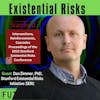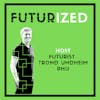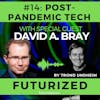Two Author-Podcasters Discuss Tech
Peter High, President of Metis Strategy, Host of Technovation podcast, and 3x author, interviewed by host Trond Arne Undheim, futurist and author.
In this conversation, we talk about how Peter High came to host of The Technovation podcast (2008-) and ge...
Peter High, President of Metis Strategy, Host of Technovation podcast, and 3x author, interviewed by host Trond Arne Undheim, futurist and author.
In this conversation, we talk about how Peter High came to host of The Technovation podcast (2008-) and get into Enterprise IT. How Trond Undheim came to host the Futurized podcast (2020-). We discuss the new book by Peter High: Getting to Nimble--a framework and best practices companies can use to transform their people practices, processes, technologies, ecosystems, and strategies for the digital era (2021). We also discuss a new book by Trond Undheim: Future Tech: How to Capture Value from Disruptive Industry Trends (2021), which contains case studies of how to apply the forces of disruption framework and its components: tech, regulation, business models, social dynamics. Peter shares his secrets of podcasting: a podcast is an album--greatest hits get pulled through columns, books, speeches and combos. Finally, we discuss the future of enterprise & IT.
Having listened to this episode, check out Getting to Nimble, Future Tech, the Technovation and Futurized podcasts, as well as Peter High and Trond Undheim's online profiles:
- Getting to Nimble: https://www.amazon.com/Getting-Nimble-Transform-Company-Digital/dp/1789667550/
- Future Tech: https://www.amazon.com/Future-Tech-Capture-Disruptive-Industry/dp/1398600326
- Technovation podcast: https://www.metisstrategy.com/technovation-podcast/
- Futurized podcast: https://www.futurized.org/
- Peter High (LinkedIn, Twitter: @peterahigh): https://www.forbes.com/sites/peterhigh/
- Trond Undheim (LinkedIn, Twitter @trondau): https://trondundheim.com/
Trond Undheim: "My takeaway is that there is significant value in having frameworks to guide our thinking on change in organizations, business and society in the digital era. Where Peter focuses on the transformation of people, practices, processes, technologies, ecosystems, and strategies in his book Getting to Nimble, I focus on five components: tech, regulation, business models, social dynamics, and the environment in my book Future Tech--and indeed in this podcast, Futurized. As Peter and I discovered, there's significant overlap in our perspectives but we also come from very different places. Peter's audience is CIOs, my audience is broader, which makes him the smarter one in terms of targeting. I'm not sure who of us gets to have more fun, but I thoroughly enjoyed talking to Peter. One should be very fortunate to work with him, I think."
Thanks for listening. If you liked the show, subscribe at Futurized.org or in your preferred podcast player, and rate us with five stars.
If you like this topic, you may enjoy other episodes of Futurized, such as episode 49 on Living the Future of Work, episode 41 The Future of Work, or episode 41 The Future of Industrial Operations.
Trond Undheim, Host (00:01):
Futurize goes beneath the trends to track the underlying forces of disruption in tech policy, business models, social dynamics, and the environment. I'm your host through an audit in time, futurist and author in episode 91 of the podcast, the topic is to author podcasters, discuss tech. Our guests is Peter High, president of latest strategy host of Technovation podcast, and 3X author. In this conversation, we talk about how Peter high came to host the tech innovation podcast and get into enterprise. It, we discussed how Toronto and time came to host the futurize podcast. And we discussed a new book by Peter high called getting to nibble a framework and best practices that companies could use to transform their people, practices, processes, technologies, ecosystems, and strategies for the digital era. We also discuss a new book by Toronto time called future tech, how to capture value from disruptive industry trends, which contains case studies of how to apply the forces of disruption framework and its components. Tech regulation is the smartest and social dynamics. Peter shares his secrets of podcasting. A podcast is an album. The greatest hits get pulled through columns, books, speeches, and combos, and how to innovate fast as a large company. And finally, we discussed the future of enterprise and it,
Peter High, Guest (01:43):
How are you? I'm well, how are you? I am doing great. So Peter, it's a great pleasure to have you on you are obviously super experienced at these things. You know, you ran a poker podcast before I was born. I was going to say, not quite, but it's close and you do a lot of advising of, of a fortune 500 executives, especially on the CIO side. So I'm very happy to have you on this show.
Speaker 3 (02:13):
It's a pleasure.
Peter High, Guest (02:14):
Thank you so much for, including me, I'm looking forward to it
Speaker 3 (02:17):
Rotation,
Peter High, Guest (02:22):
Right. Um, so you've run tech innovation, uh, podcast, and you've done that, I think for 12 years, that is an enormous amount of years the podcast. Tell me a little bit about how you got involved with that. You too. Yeah. Thank you for your interest, John. So, so you're right. I'm getting an a normally in the podcast game I benefited because a dear friend of mine, um, was, uh, friends with the
Peter High, Guest (03:00):
Founders of Twitter, which you may know originally started as a podcast company. And so on a weekend trip with them, uh, this would have been in probably early Oh eight. Um, I learned about podcasting for the first time. I had never heard of it. There's still the relatively early ages of, of podcasting. And as I delve more deeply into it, following that weekend with my friend, um, I discovered that it was a medium that was even then even more so now was relatively, relatively easy and cheap, uh, to take advantage of. And, uh, there was a confluence of a couple of factors that made it particularly ideal for me. I had just signed my, you know, wait, I would, would go on after that conversation with my friend to sign a book contract for my first book, a book called world-class it. And you of course are a, uh, a fellow author, a prolific one at that with, uh, your, your productivity of multiple books per year.
Peter High, Guest (03:55):
Um, and as I was reaching out to you in speaking with members of my network to, to draw out stories that I would use in the book, it dawned on me, this was actually the perfect opportunity to leverage those conversations. Of course, with everyone's blessing, uh, to double dip, a little bit to record the conversations, put those out there into the world, and then to take some of the most salient points from those conversations and leverage them in my books. And so that began in November of 2012 and now I guess nearly 12 and a half years later, uh, it continues. And, um, as of now I think we're 500, we're approaching our 550th broadcast of, of the Technovation podcast.
Speaker 3 (04:40):
[inaudible]
Trond Undheim, Host (04:40):
Well, there's lots of things to pick up here, but one of the things that you, you said, you called a podcast, a bit of an album, so of greatest hits and, and the books, different albums, like you use that, that, uh, metaphor. I like that a lot. So you pull in different type of content and you're able to, to really learn a lot from these interviews. And I have to say in the short time that I have done podcasting, which now is, uh, you know, coming up on like nine, 10 months, there's an enormous amount of stuff to learn. And I'm embarrassed that as a researcher, I wasn't really recording all of my conversations. I mean, forget even the public, right. That's the whole extra benefit, but just even just recording every time you have a conversation with someone interesting, the value of just rehearsing that at least for someone like me with poor memory and recall, uh, the, the structured learning you can get just from your own conversation. And I obviously learned more from the other person, but even just, uh, you know, rehashing what, what I was talking about. It, it becomes a narrative and you have 12 years of it. It's a very rich
Speaker 3 (05:51):
Set of data.
Peter High, Guest (05:54):
Yeah, it's absolutely right. I agree with you one of the blessings of my life, and I'm sure you, you, you see this as well, Tron given how many conversations you're having with people of interest, uh, is that I have reason to be in such regular conversation with people who are shaping the technology landscape. And it's the, the, the wonderful thing about having these outlets, uh, for, for the content of those conversations, which certainly of course helps the yield on invitations for conversation, uh, means that, um, I, I can, I can reach out to a great number of people and in many cases anyway, uh, gain an audience with them. And, and just, as you say, learn from them, understand some of the stories, some of them very magical, uh, that represent their practices and what they do and the, in the various settings that they come from.
Peter High, Guest (06:43):
And just, as you say, yes, you, you, you recall, uh, analogy we've just described before I've described before, you know, I, I think of the, you know, a hundred or so 110, 115, or so interviews that I do just in my podcast and some additional ones for my writing, for Forbes and other outlets as sort of a, an album that I'm keeping. And then it's the greatest hits from that album that I can maybe put on a stage for, up for a conference that I'm curating or, or certainly, uh, for the, for the, some of the, really the best stories put them in book form. And so it becomes a really wonderful way to have this running library of, of content, as well as an ongoing filtering process as to, uh, what good looks like and what world-class looks like in a variety of different topics.
Speaker 3 (07:33):
[inaudible]
Trond Undheim, Host (07:33):
So that's great. You know, one thing I wanted to get to is we have both of us written books, uh, on, uh, on the Kogan page publishing label that are coming out, or they are out in Europe, but they're, they'll come out in, uh, in the U S uh, on the 30th, your book getting to nimble. We'll, we'll talk about it in my book, uh, future tech also coming soon, it strikes me that, you know, for your podcast tech innovation, a lot of the conversations there must be really resonating and, and really communicating well with that book. So getting to nimble as we were getting into it, but you, you have all these case studies of, uh, I guess C-level executives, the same audience that you're interviewing on the podcast with, uh, their learnings and your sort of elaboration on how they are trying to get nimble, uh, examples, I guess, of really best practices, but also struggles in, in getting to nimble. I wanted maybe have you explain the whole framework around nimble, how do you come up with it and what, what do you, how do you define being nimble in this business context?
Speaker 3 (08:47):
Yeah.
Peter High, Guest (08:47):
Yeah. Thank you. And congratulations to you Tron. It said, it's nice that, uh, we were, we're giving birth to this product, that the say on the series same day as it turns out. Um, yes. So the idea behind this really is that, especially for companies born before the digital age, though, I, I hasten to add that these ideas, I think actually also apply very well to those born in the digital age, but especially those that are, let's say, you know, 25, 30 years or older, that there just tends to be, um, legacy practices that need to be modernized re practices related to people, process technology, uh, broader ecosystems and their curation, as well as strategy. And thinking further about the cascade from enterprise strategy to technology, digital strategy, and ultimately data strategy, which is so much more important these days, obviously, and making sure that organizations are mindful of their levels of maturity relative to those five major topics.
Peter High, Guest (09:46):
I, I proposed seven, uh, 27 rather sub themes associated with those five that are important to measure, to, to gauge progress or lack thereof, and to, uh, ensure that you are getting to a level of maturity appropriate relative to all of them in order to better compete, uh, in this day and age. Um, you know, th th the, the I'm so pleased as someone who has worked with digital and technology executives for across my entire career now spanning about 25 years or so at the advances that technology have made to make these, this, these functional areas within major enterprises, that much more influential. We see that of course accelerated as a result of the pandemic, uh, and, and the, the new ways of doing work that have been thrust upon us in the past year. Uh, and frankly, those companies that have been most resilient are the ones who've been most nimble.
Peter High, Guest (10:42):
And the, by that, I mean, they are the ones who when opportunity presents themselves, they can pivot most readily to seize those opportunities. And just as issues arise, they can, they can stave those off and pivot away from them, uh, most readily as well. And there are a lot of organizations, unfortunately, once, once great organizations that have not gone through these practices in as measured a form, as I suggest. And as a result of that, let me just give you a quick statistic. Um, if you, your company was on the S and P 500 in the 1950s, the, your average tenure there, the, the average duration, rather that you would remain on, it would be 61 years. Today. It's closer to 15, and it's a remarkable story, both of creative destruction as major companies, uh, ebb and flow, but also of creative, uh, creative energy and innovation as new companies rise so dramatically in order to take the old stalwarts place places.
Peter High, Guest (11:40):
And as a result of that, if you are not able to change to be nimble and have the practices associated with it, there were some pretty dramatic potential consequences, but I, by haste Nat of course, flip side of it is if you are oriented towards this, if you make change a core competence. In fact, um, as, as, as Ben free did a story, uh, told in my book, then freed the longtime CIO of Google as an explanation of how, as they become a behemoth, they've remained so nimble, uh, in his, his answer to that question was by making change a core competence that, uh, if your organization doesn't have that in your DNA, then, uh, then, uh, they're, they're, the, the consequences actually could be pretty, pretty lethal.
Trond Undheim, Host (12:26):
That's fantastic. So in both of our books, we present these frameworks and they're actually remarkably similar. I wanted to just reflect that. So, uh, you know, in my book, I talk about the forces of disruption. And even though I have called a book future tech, uh, of course, you know, several of those forces really aren't about technology, but they're about either how receptive we are to the technology or, or how we are reacting and must react to it. So, you know, things like regulation, business models, which, you know, I believe in your framework would be kind of covered more under sort of strategy. And then in my framework, social dynamics, so the entire specter of sort of consumer issues, anything to do with the social reception of the product, and also the preparation that how different societies are receiving technology differently. I wanted to maybe have you address some of those non technology aspects that are really coming out in, in, I guess, in both of our books, because you speak of people in process, and then you, you, you obviously have technology as a featured chapter, and then you come back to it, but then you speak about ecosystem, which is a word I also use, uh, you know, throughout in, in, in several of, of the sections.
Trond Undheim, Host (13:49):
But, um, I wanted you to maybe give us a little bit of a flare and a flavor of what each chapter is trying to do. So if you think about your people discussion, I know capital one is an example, and they've done several remarkable things to try to really reach out to their customers, maybe also their employees in different ways. Yeah,
Peter High, Guest (14:11):
Indeed. Yes. And, and you, you, you raise such an important point trend in, in as much as, uh, it's easy for us to think about the technology changes that are necessary in order to, to plan for the future and they are profound and they must be, uh, considered measured, and actions must be taken, of course, but at the end of the day, you could have the best technology in the world. But if you have a corrosive culture, if you don't have the right people doing the right jobs, if you don't have a learning agility for your organization, such that you're building a team that strives to have the, the, the skills of the future, as opposed to the skills of the present to say nothing of the past, then, uh, you know, the, the technology isn't isn't worth much. And so absolutely a key ingredient, the essential foundational ingredient in fact is, is the people that you have, the team you have and the, and the culture that you're building.
Peter High, Guest (15:02):
Um, and you're right. Capital one is a, is a great example, um, uh, which I, I, the story of which I try to tell, at least in my book of an organization that has made the change from a typical it organization to, uh, changing the, the, the, the way in which the company thinks about itself now, really as a technology company, that happens to be in the financial services space and Rob Alexander, or the CIO for about a decade and a half now, uh, has been responsible in a great way for, for that change and really building engineering heft, uh, to the company. And, you know, for so long, I've been doing a lot of, um, speaking of late comparing the, the last economic crisis to this one and the last economic crisis of 2008, uh, it departments were decimated. And a lot of that still had to do with the residue of this reputation as being a cost center within the organization, typically, uh, typically reporting to the CFO's of those, those companies.
Peter High, Guest (16:04):
And therefore when, when times were bad, this is an area to go to first, perhaps in order to simply slash the budgets. And of course, in many cases, those were people who were let go in order to slash those budgets and then amplifying a trend that had begun before that further towards outsourcing and really kind of reorienting orienting the way in which a lot of organizations thought about technology as primarily a buy, as opposed to a build mentality. And I don't mean to cast aspersions towards the buying of technology. Of course, having part of the ecosystem point in fact, is having a great set of strategic partners that you're engaging from a technology perspective. But if you don't have the, the, the, the, um, the, the sort of skills internally to do some of the building as well, to develop the technology, the future to innovate around technology, well, then your competition will be doing that, uh, uh, much faster and better than you you will do.
Peter High, Guest (16:59):
So it does require having this engineering mindset and building the skills to make that a reality. And I'll just add one other anecdote that I think is among the things that makes capital one special, they've really thought rethought the whole nature of how to recruit. Um, Rob tells us story about how they, they are loathed to hire people at senior ranks because doing so is very expensive prying. The best people loose can be very, you know, very difficult undertaking. Uh, and, uh, obviously they come in without having grown within the culture of the organization. So he much prefers to find people junior and pull the best of them through rapidly through the organization, up to leadership positions. And so they've developed this phenomenal intern program, uh, which is really the gold standard. It is often on vault.com listed as the best internship in the United States.
Peter High, Guest (17:48):
And they take hundreds of, of, uh, top qualified people whose other, you know, jobs they're considering are Silicon Valley type roles and responsibilities. And in essence, they, they use the summer internship as the greatest, uh, interview process of all, of actually testing people in the, the actual work environment on real work for the company and the people who are best at those jobs are given offers. And apparently the yield on those are quite high and thus into the system, they go with, again, the best of those people being provided great opportunities to rise quickly, should that be their ambition? And so you're right, trying to focus on the people aspects of this as really elemental, uh, because that's, that's truly my belief as well,
Trond Undheim, Host (18:33):
But of course there are other aspects that are related to people, but they, they bring in the different capabilities that people have. And I was th I'm thinking of the way you describe process. So for me, you know, my framework is more from the perspective of an outside, uh, you know, read on what's happening, you know, in, in the world of technology, but it can be equally used, I think, to understand process inside of a company. And one of the things where I think there is a synergy in what we're talking about, you, you mentioned DevOps, this whole trend of, of, uh, basically taking two professions really, and two separate types of expertise. And then how smart companies, uh, you know, over the last decade, really have managed to fuse those two things together and see operations as not distinct from technology. That's at least how I read it as a headline, what dev ops is all about.
Trond Undheim, Host (19:30):
And it's a new way, both for engineers to think about how their skills integrate into the organization. And indeed for the cadre, I guess, of operational officers at the C level and, and other places to really more embrace that aspect of, and you were, you were on it, right? You, you have to grow some of that talent. And some of those processes inside of your own organization, you can't just look outside and pick up trends and funny, you know, high flying technologies and, you know, AI and whatever it is. Speak to me a little bit about how dev ops has changed large organizations when it comes to thinking about technology.
Peter High, Guest (20:17):
Great. It's a great question. And I would, I would include it as part of a broader trend of rendering, the traditional silos of the organization. More permeable, uh, silos are not going to go away. It's not like there won't still be a finance department or a, you know, a, an operations department or product and service areas of the company. And of course it departments, but, uh, to much greater extent, there's a recognition that value happens at the intersections of those traditional disciplines. And so the more you have reason to bring people together, the better the results, uh, I would say as a, as a predecessor to dev ops is really agile development to, uh, to, to a large extent of including the intended audience of what you were developing as early as possible, and, and including them for validation of progress or lack thereof, canceling things much more quickly when value is improving, you know, tailoring things and re re reshaping them, um, as it is.
Peter High, Guest (21:12):
And, and, and off you go, you're right, dev ops, bringing together as the, as the portmanteau suggests of development and operations to traditionally siloed parts of, of the organization and bringing them together so that you're removing that wall, that you're kind of throwing things across, uh, without necessarily having the, the important context of what's being thrown, thrown, thrown over the wall, uh, to be operated. So to say, um, this is, I think is an important aspect of building things better and then evolving them better to a greater extent. And so I would say that the, the next phase of that, which we're also seeing, uh, increasing is the orientation to the change in orientation and operating model from project to product and having a lot of technology and digital parts of organizations thinking much more of what they're building and even thinking about the areas of their responsibility as products, products, to be evolved, uh, products to innovate around and, and so on. And so there's a continuum of, of, of topics that I know that we're both passionate about. And both of us cover in our books that represent real opportunities for greater collaboration across the enterprise, certainly extending outside of the enterprise to broader ecosystems. And of course, ultimately to customers, people who provide the revenue for any company, uh, in order to make sure that what's developed is as you know, effective and adds the most value possible. But I think these are a combination of trends that are profound.
Trond Undheim, Host (22:42):
Well, interestingly, when you speak of technology also in the chapter where I believe it, which is called technology, you speak of, uh, at one point Comcast, but not from the perspective of their excellent technology, you know, in like a narrow sense you speak about self-service. So it goes again, I think to your point, that when you see technology as product, that it changes what you're creating as well. So here you're enabling a client product, not only that you're enabling the clients to help themselves, which of course, in the early days of it was, I don't know, at least for me, it was slightly annoyingly. These banks were just outsourcing their services to me, right. So, you know, some of it is very, it's just clever. Other parts of it is actually liberating. You are creating something extra, you're giving me control back. You're giving me visibility of my, whatever it is, you know, finances or my, what services I actually have offered, uh, have a, you know, uh, under offer. Tell me a little bit about how technology, you know, at the top level, which you've worked with so many C-level executives who is involved these days in the technology conversation and, and, and, you know, as it relates to clients is, uh, that's no longer just a conversation between product people, as you're saying, it's, it's, the CTO has to know something about the end client. They can't just sit there and develop fancy. Exactly
Peter High, Guest (24:09):
Accurate. Exactly. Right. And so what this means is the people who run technology do in fact have to have much better customer interactions. It's been interesting trying to see the proliferation of titles within the technology domain, chief information, officer, chief technology officer, or chief data officer, or chief digital officer, or chief transformation officer, chief innovation officer, I could go on. Um, and if you think about it, the purview of any one of those, uh, that you and I could come up with a few bullet points as to what we would surmise would be under the envelope of any one of those titles, you know, why doesn't that roll up to, uh, as it does still in any organizations and very effectively in, in some anyway, uh, up to two to one set of responsibilities, the answer in some cases is they're not finding what they really want out of the executive is who has traditionally run technology at such that they, you know, that's going to be the, the, keeping the lights on the old way of doing things let's bring in some new blood, give him or her a new title and a new set of responsibilities, and even a new team, uh, to accomplish the, the, the, the, the innovative and sexy stuff that we anticipate creating, obviously, uh, at the same time, uh, a Venn diagram with quite a bit of overlap and the introduction potentially in, in, in really negative circumstances of added politics and confusion, uh, as these purviews need to be sorted out because certainly they are not mutually exclusive.
Peter High, Guest (25:26):
And so it's really interesting. I, I think the best organizations do have it roll up to us to, to a single executive who of course does keep the lights on. So to say, but also is involved in the development of new products, new services, new technologies, ultimately to enhance customer experiences and, and in fact, to get them to buy new things from the company. Uh, but that does require not only having a great sense of, of the capabilities of the organization, the processes across the organization and how to use technology to, to optimize all of that, but to a much greater extent customer touch points, which have not been the domain of, of the technology chiefs traditionally. And so the, the best ones are in fact, those that are Mr. Ms. Inside and outside to a much greater extent to have that, that a more comprehensive view and set of lenses as to where value can be created.
Peter High, Guest (26:18):
Um, you know, I, I, I, I mentioned in the book as I have elsewhere that traditionally a tech chiefs, a CIO CTO CDOs have largely been focused on the bottom line aspect of the profit equation, costs, costs, efficiencies, cost savings, and so on. They need now to be on both sides of the profit equation, thinking much to greater extent about the revenue implications of the things that they and their teams might be doing and advancing the metrics that the CEO and the board are most interested in, not just, you know, a subset of those as had traditionally been the, been the case. So you're right. It's a conversation that, of course, first and foremost is likely guided at least in an organization that isn't itself, a technology organization. It's a slightly different conversation, obviously, if, uh, if we're talking about, uh, you know, a tech company at its heart, but in an organization where the preponderance of tech talent is in the, it it's that team and its chief who are going to be the leaders of that conversation.
Peter High, Guest (27:13):
But, you know, perhaps beginning with the consumerization of technology, uh, that the smartphone revolution and the iPhone especially ushered in for us all now, all of us are technologists to some, some degree, even if we don't have computer science or engineering degrees, we, we appreciate the profound impact that it has to a degree that executives in the past would not have. And as a result, the best technology executives are using that as an invitation to convey the art of the possible and start a series of conversations in ways that they wouldn't have been invited to in the past, quite frankly, and this is pulled all the way up to the board of the organization, Tron as the best of these executives are themselves populating boards. And hopefully in, so doing at those very companies, engaging the technology chiefs themselves in those companies in some different ways, both for reasons of, of defense from a cybersecurity perspective, perhaps is the most prominent example of that. But also with, and I'm talking about the board level, also very prominently for offensive reasons as well, how best to use data, for example, to, uh, uh, to, to, to develop, uh, a better means of operating the business and develop better conclusions more quickly as to what to bring to markets and why, and, and those sorts of things among the whole panoply of ways in which, um, uh, in which data can be used to profoundly impact the enterprise.
Trond Undheim, Host (28:32):
Speaking about advice, you know, both you and I speak about this need for the corporation, you know, obviously to open up in various ways, and we've talked about it on the client side and being open to your own people, but then you have this notion of ecosystem and ecosystem can mean many things, but certainly, you know, people have stretched it and companies are stretching it to their clients, communities, and building powerful communities around their product. So this is an extension of what we're talking about, but you speak about a topic that's near, near to me, which is, uh, connecting with VCs and also with startups. So this whole getting input from outside parties that could inform your business, right? And in my book, uh, you know, that's about understanding things about disruption that might prepare you for your next product might even change your next product, or it might give you a guide on where the future is headed, which, you know, none of us know where the future is headed, but we need to be ready. And like you said, we are not going to last necessarily 60 years on, on NASDAQ anymore. Certainly not. If we're not in touch with innovators, tell me a little bit about how you see the importance of a group. Well, either startups or VCs, you know, VCs being kind of a, an intermediary to the market and they see things early, they listen in a very different way, I guess, than a traditional board member would, would do.
Peter High, Guest (30:19):
Yeah, it's a great, I, and of course this is an area, you know, so, so well, uh, for, from your, the work that you do. Uh, so you're so proud, profoundly aware of this. What I would say is, uh, competition today is less company to company and rather ecosystem the ecosystem. Uh, any company of a, of a certain size has a cadre of strategic and important partners that they go to market with, whether it's members of their supply chain, whether it's, um, other companies who together with, with, uh, one's company are bringing products to market or services to market, you know, whether it's, uh, people who are contractors and the, and the firms that are, that are providing those contractors to the firm, you know, just to name a few of many, many examples that one could. And so, as a result of that, and an advantage of that, frankly, if managed well is you have that many more recent, uh, sources of potential inspiration for innovation.
Peter High, Guest (31:10):
And so what I suggest by way of ecosystem for, in my telling anyway, is that it's critically important for a technology executive to assemble his or her own ecosystem as well. And the way I described that outside of the company, of course, their ecosystems, they ought to be developing of, of a kind inside the company as well, but outside the company, it begins with one's peers. Um, you know, the great thing about technology, chiefs, technology and digital, um, uh, leaders is those roles rhyme to a great degree, even if the companies and industries that they are represented are very different. And as a result of that, having a wonderful group of fellow chiefs, uh, heads of technology and digital to whom any single one of them can turn, becomes that much more important, because this is a complex job at the end of the day, there are all kinds of issues that are rising in addition to opportunities.
Peter High, Guest (31:58):
Again, getting back to the concept of nimble and then the need to parse those out and, and, uh, stave off one and, and, and seize the other respectively. And so, as a result of that, having a great group, you know, of A-plus, uh, fellow peers, to whom to turn on a regular basis with issues that you're grappling with opportunities, you're grappling with curiosities or hypotheses to test becomes a great way to get to answers more quickly, and to have more confidence in the answers you're choosing the second layer to this is certainly the venture capital community. Just as you say, a community that you represent, uh, personally Tron. And for me, the way that I, I, I think of it is this is the way to understand where smart money is being spent and why, where is the future of technology going, who are the companies that are going to be going to define that future, and what are the potential applications back to my company?
Peter High, Guest (32:48):
And how do I get to know some of those entrepreneurs and maybe frankly, have them shape their offering, such that it's of greatest value to me in those cases where that's appropriate, maybe even invest in some of those very companies along the way as well. And so again, having a, um, a degree of curation of those kinds of opportunities and those new technologies and those entrepreneurs with some trusted advisors in that community, uh, who are themselves hungry for these kinds of relationships, because of course, those venture capitalists, for example, who have at least a portion of their portfolio dedicated to enterprise technology, well, the people that are buying that enterprise technology or those very same technology and digital chiefs, and so very symbiotic, the relationship between them and the further one gets from an area like Silicon Valley among other tech hubs. Oftentimes it isn't recognized by the technology and digital chiefs, just how symbiotic that is.
Peter High, Guest (33:38):
So I certainly encourage those that I know best. And now through my book, hopefully grow a greater number of them to delve deeply into those, those relationships and just choose wisely, of course, in terms of who to turn to most often with questions related to that, just to quickly round out the other two aspects of the ecosystem, executive recruiters, who of course are, you know, sources of potential opportunity for your next job. But I would also say if you, if you, again, uh, curate those relationships well, sources of inspiration as to where technology is going, what are some of the org changes that are happening? What are the skills that are rising? What are the reasons why a technologists, my peers are failing since of course, oftentimes they're brought in after the failure of a leader and that leader replacement. And so those among many other instances are the kinds of insights.
Peter High, Guest (34:24):
One can more readily grapple with and grasp and, and take action upon as a result of the advice of some key leaders and advisors in the executive recruiting space. And then the last one, which I alluded to earlier, Tron is the, uh, our strategic partners in the technology landscape. You know, you, you hire them presumably because of their experience with companies like yours, if you're not tapping them for insight as a result, uh, of, of what they know, uh, hopefully never sharing proprietary information, of course, because if they're doing that to you, then they're probably doing that, taking your information elsewhere as well, but at least hopefully anonymizing some of that and bringing the world of their experience to you if you're not pushing them to gain those sorts of insights. Well, then I would say that you're also getting half the value add most of what you should be in terms of those relationships that you're choosing. So collectively that's, that's a, at least a good portion of the ecosystem. I would suggest that technology and digital leaders build and then
Peter High, Guest (35:19):
Like a garden pruning and real fertilizing aspect. Taking care that you are both offering back to that ecosystem but also gaining insight that can impact your operations.
New Speaker (35:24):
So it's not really last chapter is to both offer back to that ecosystem, this is not one way at all leaders, but also in the process that I'm thinking of getting insight strategy concept, I guess, which I'm curious to hear what your take really is on, on, on this topic curiously, when, when, you know, when academics write about it, I think they all end up with, you know, not really being able to define it and, you know, famously basically it sort of crumbles and disappears when you start talking about what it is, but perhaps it's easier to talk about in terms of, uh, tech strategy or, you know, within a domain. I don't know, but I'm reminded of, you know, over 10 years ago I wrote a book called leadership from below. And one of the ideas there was sort of thinking about maybe strategy, the, you know, turning that on its head because you know, some of the trends that we have been talking about here really is that you're going outside, you know, in order to gain the experience so that you actually can make up your strategy.
Peter High, Guest (36:27):
It's not like you can sit there in the ivory tower and develop these super smart strategies in isolation without your ecosystem, without your clients and in some cases historically, right. Even without your employees. So I was curious, why did you put it last in the book and is there still a place for strategy given what we know, which is things move so much faster. So, you know, a five-year plan may not be as smart as it was 20 years ago.
Peter High, Guest (37:15):
Yeah. That's a great, great question. And I'll, I'll take it in the reverse order if you don't mind. Uh, but I, but both very, very good questions. So I would say strategy certainly still matters. You make a great point in terms of the pace of change. Uh, and, uh, you know, I even make this point in the book, there are those who might say because of the pace of change, because, you know, uh, two years, three years out, the things that will be our top priorities may be unnameable today because the trends that will be driving them may not actually have emerged yet. And yet in that short amount of time, they may, or may not only emerge but blossom and then become that impactful on any one company or an industry. And so being aware of those changes and, uh, making sure that you're constantly monitoring the yard of the possible and its evolution becomes that much more important that said it's still important to have a true North.
Peter High, Guest (38:03):
Um, where are you going and why? And I would say it's important to have different lenses to that, to have plans that are shorter in duration a year, or maybe even in some cases thinking, uh, um, a little bit shorter term than that. Um, the, the, the, the, the future in that timeframe, all those still dynamic, um, is probably stable enough that it's worth putting to paper. Where do we hope, hope to go? What is this collection of activities that make up our product services, your body of work, what is it getting us so that you have everyone pushing in the same direction? And I would actually say in some
Peter High, Guest (38:36):
Ways, that's one of the main reasons why you want to have that happen in a large complex organization, absent strategy. People will unintentionally be working against each other. If there's not a great plan in place. Uh, people may think that, you know, we should be going West when in fact we're supposed to be going East. And as a result of that, they're plotting, uh, you know, they're, they're using maps and plotting paths that are in opposite directions. And as a result, you're making minimal progress, uh, or perhaps worse as a result of that. And so I would say still have those plans in place, by the way, would also still have a narrative that is kind of, where do we see the future two, three, four, five years out recognizing that that's going to constantly be changing, but having the discipline within your organization to understand how macro economics, how politics, how am I industry dynamic industry dynamics, how the startup community that's impacting my industry as well, and a variety of other things will lead to the change in those assumptions.
Peter High, Guest (39:31):
So charting a path, noting the assumptions and hypothesis behind it, constantly testing those for those that were the tests, fail, making some modifications and changing and never, you know, regretting, uh, or being too, sorry about saying, you know, we, we, we started on this part of the path that proved the, is not the right one. We're going to change our efforts there, nothing wrong with that, of course. Uh, and then plotting along again and all the while communicating, making sure that the organization understands when those changes are happening and why, let me get to your second question, uh, rather, excuse me, your first question, which was, why is it last, uh, it's a great question. In many ways, the strategy ought to be, you, you think of it as first, if it's a startup kind of who are we and where are we headed? And you know, why are we in the, in this industry and why have I heard you number two and those sorts of things.
Peter High, Guest (40:20):
Um, but what I would say is, as I'm, I'm, especially, um, writing this book for large, medium to large size organizations going concerns that, uh, certainly you still need to have a strategy. And it's kind of in some ways, as you can appreciate as a, as a many time author yourself, Trond, that books are the story of a book is in some ways told serially from, from page one to page N but, uh, the, the, the course of which the, the different parts of, of what's represented are going to be happening all at once in many ways as well. But, but that, that's not a cop out to say that, that the strategy isn't still representative as last it is because if you don't have great people doing their jobs, right, if you've not modernized some of your processes, if you've not furthermore, modernized your technologies, if you've not built that ecosystem around that you don't have the necessary ingredients to have the best strategy. Now, it doesn't mean stop your strategy until the other four topics are optimized. Of course not. You know, still have your strategy, you book before plotting using, uh, points of reference, like, like you're a great book, future tech or my own. Um, you still need to have a plan in place and, you know, you're, you're marshaling resources, human and financial, uh, in order to drive those things forward,
Peter High, Guest (41:34):
Still do, but as you're maturing those other things, they're going to add color wrinkles and new sorts of opportunities that themselves will be, uh, will breathe life into new aspects of the strategy itself. So I would say for strategy to truly be optimized, to be podcasting at its best, the other four areas, we'd be tied to be optimized as well as brought to a level o f maturity through we'll allow the organization to be of the strategy of the podcast, to reach out to people and get incoming from, from people who, who have messages that they want to discuss. What are some of the other methods, or would you recommend everybody gets a podcast to, to essentially equip you to see all these things that you have seen in your book? And, you know, I'm advocating, you know, basically a set of ways of thinking about the world to simplify your life.
Peter High, Guest (42:31):
But I mean, certain buckets, so you can start structuring, you know, when you're looking for startups, you know, what are you looking for? Well, you're not just looking for the technology. You're looking to figure out where they fit in the regulatory landscape or other things, but what are, if you have some advice to people that maybe they are your targets. So they, they, they are working in big organizations, certainly, you know, following your podcasts, they will listen to their peers. They will hear you asking difficult questions and they can read your book, getting to nimble. So partly your answer surely is that, that there's a nimbleness as at the heart, or getting ready for the future. But beyond that, w what are some sources of information? Are there, is books really as sufficient source these days, or are these sort of random conversations listening to other people's podcasts? It doesn't strike me that, you know, going to a four-year college or getting a two year MBA, these are kind of, old-fashioned ways of going about learning, but what are the best new ways of learning? It's hard.
Peter High, Guest (43:52):
Yeah, well, I, yeah, it's, it's a, it's a great question, Tron. And I would say, um, you know, I say this to my, my, uh, my kids all the time. I have a 15 year old and a 13 year old that the common denominator among successful people, no matter the field is that they are readers, that they are people who are constantly striving to learn. Um, and I think by extension now, reading can include so many different media types. Of course, reading now can be done with your ears. Uh, as you listen to audio books, for example, uh, podcasts are in fact, another, another great way to, or video form all kinds of different ways. Um, you think of the number of massive open online courses that are the MOOCs
Peter High, Guest (44:32):
From Coursera to you, Udacity to ed X, to LinkedIn learning, et cetera. These are all great sources. And I might add so many of these are relatively cheap, uh, in terms of, uh, your ability to take advantage of them, especially at a, on a, on a, even a larger scale in an organization. So developing that kind of learners mentality of constantly striving to learn new skills for the future becomes that much more important. Um, you know, I I'm, uh, there's a great documentary on right now about bill Gates and Netflix, um, that Netflix has done about bill Gates. And it talks about how he does these retreats to some home, a couple of hours away from his house in Seattle. So it's still in Washington state, I believe. And he brings, it brings a big bag of books with him, and, uh, he has minimal distractions and he's there alone just with his thoughts and with the ideas that he's pouring over in those books, you know, and it strikes me, especially during the time of quarantine Tron, where so many of us are going from zoom call to zoom called a zoom call and not necessarily making the space necessary to synthesize what we are learning.
Peter High, Guest (45:40):
And to simply just think that it means finding more of those opportunities. I was on a call just a few days ago with an executive who indicated that for him and for his team, he's established Friday as no meeting Friday, and they clear the calendar, and it's just an opportunity to, to, to synthesize and various ways in which that might happen. It may be building that presentation for the board. It may be, you know, thinking about that new product. It may be taking the idea that, that you just thought about in the shower a couple of days ago, and starting to develop the skeleton of it, uh, and see whether or not it's worthy of further investigation and bringing to your boss. And so I think we need to find, we need to, um, provide a mechanism for our teams to create that space for those, uh, that creative thinking to be done.
Peter High, Guest (46:26):
And so, you know, as I said, as I say to my kids, you, you need to be a, you need to be a reader. You need to be a learner in the various forms of that might take, uh, because that's how you constantly refresh. And frankly, I think it's one of the ways it's the spice of life in many ways, as well as finding those new insights, that inspirations that might impact the path that you are on personally and professionally as well. So in some ways it's kind of taking that ecosystem concept of having a lot of good friends and tapping into the knowledge of those good friends providing, and that luckily for me during and extending your body of knowledge, that's available through so many medias from books to podcasts, to video to you, fill in the blank with the various areas of most media landscape.
Trond Undheim, Host (47:10):
You've had it all wrong, right? In terms of what working hard and productive really means. It's not to get the most things done. It's more the empty spaces in between where we can take the time to actually make the connections that we wouldn't otherwise have made, whether it is, you know, in our business, in our life,
Peter High, Guest (47:30):
Or, you know, to make these cognitive leaps as it were, where we're, where we're actually innovating, right. Because, you know, what does being creative really mean? It certainly is not directly related to being efficient. It's actually something quite the opposite almost. So bill Gates may be an extreme case. Not all of us, you know, would, would have a fantastic weekend if we were pouring over 20 books, that would be paradise for me, but I can imagine many executives finding that slightly boring, but it could mean different things, obviously. So, um, as, as we're rounding off, I wanted to ask you sort of just one last question, uh, if you're looking into the future in your field, right? So enterprise it, and, or the future of enterprises, uh, as it were, where, where are we heading and how does one best innovate fast as a large company are there? And, you know, is there going to be a template for this, or is it just going to be the answer of your book, which is don't plan too hard because you have to be nimble
Speaker 3 (48:53):
[inaudible].
Peter High, Guest (48:54):
Yeah, well, so I think that nimbleness is going to be important too, to get them the most, um, opportunities. The more turns to the plate, you know, if you think about a company like Amazon, for example, and it's of course, easy to point to the, the world beating companies as the models, but, but hear me out here, what, what is special about Amazon is, uh, not only is it just this remarkable idea factory and an incredibly creative culture and, and, uh, you know, naturally a compa ny now that is become a leader, both in B2C, as well as B2B in a really remarkable way, but they just, they, they have more trips to the plate, forgive a baseball analogy. They have more shots on goal, uh, then than anyone else one might argue. Uh, and we don't necessarily remember the failures. Do you have an Amazon phone?
Peter High, Guest (49:44):
I don't, uh, I never did. And not enough people did for that to be a successful product, but, you know, Bezos talks about the things they learned from that failure. In fact, products that drew from some of the innovations of it, that themselves became, uh, important ingredients for innovations that succeeded. And so a lot of this is just having that, that makers kind of perspective and making it okay for people to try things and to fail, but to learn from them each time and put some of those learnings, very definitively into something else. There's been an emergence, as I'm sure you've seen as well, Toronto innovation labs and a lot of big companies, and to be perfectly candid, this has been a mixed bag in terms of their rate of success. Many times, it's just sort of a
Peter High, Guest (50:28):
Pure, a series of prototypes that don't really move the needle for a multi-billion dollar organization in developing the next billion dollar or multi-billion dollar product or service. And so there that translation from a series of great ideas to scaling up a certain set of them to do something that's really meaningful, that's a different kind of set of muscles. And frankly, in many cases, a different, uh, you know, team, uh, makeup that's necessary in order to bring that to life. But I think there's something there there's something that's required to in helping the organization develop that, that innovator's mentality. And, you know, I think of the way that Andy Grove used to think about it used to convey things that at Intel, that Intel's biggest competitor is Intel. And we need to be the one cannibalizing our own, uh, products and coming up with the technology of the future, not waiting for a competitor to do so.
Peter High, Guest (51:19):
We, we, each of us, I think, need to be thinking in that same sort of way within our own organizations, what are the things that were maybe the, the things we were most proud of? I tell the story of Rob Carter in the book of FedEx, um, who, you know, having spent time also with Fred Smith, the CEO of the company and founder of the company, it says there's not a strategic decision in the company that doesn't go through our CIO, Rob Carter, and, um, that, you know, he, he's, he Rob recognized that the crown jewels of the organization its technology were, uh, which he, he rightfully was very proud of. Uh, we're going to be the source of the company's downfall if he didn't modernize them and then went about doing that. And so thinking about what is the future of, of this thing that that's going to replace? The thing that we were once most proud of is a really interesting, uh, existential question that requires a lot of humility. If in fact it was you who helped at least come up with it in the first place. And so we need to have leaders. We need to, we, we, as leaders need to foster teams in order to bring about,
Trond Undheim, Host (52:24):
Because as I say, change is the only constant . [inaudible] whether we're ready for it or not, there's no song again and again, and learn,
Peter High, Guest (52:37):
Learn more. So thank you so much also for sharing, uh, your, your years here on, on, on my show. Well, uh, trying to, it's a pleasure for me to take time on, on your great podcast as well. I wish you all the best with it and with your book as well. Um, I'm sure that you each will continue to make a Denson in, in this space. Also,
Trond Undheim, Host (53:16):
You have just listened to episode 90. One of the futurize podcast with host Trond Undheim. The topic was Two author podcast, discuss tech. In this conversation, we talked about how Peter high came to post the Technovation podcast back in 2008 and get into enterprise. It, we also talked about how strong and came to those. The futurize podcast, 2020, we discussed a new book by Peter hike getting to nimble, and we discussed a new book by Toronto time. Future tech, Peter shared the secrets of podcasting. My takeaway is that there is significant value in having frameworks to guide our thinking on change in organizations, business, and society in a digital era where Peter focuses on the transformation of people, practices, processes, technologies, ecosystems, and strategies in his book, getting to nimble. I focus on five components. Tech regulation is models, social dynamics and the environment in my future tech and in this podcast, if you trust as Peter and I discovered there is a significant overlap in our perspectives, but we also come from very different places.
Trond Undheim, Host (54:32):
Peter's audience is CIO's. My audience is broader, which makes him the smarter one in terms of targeting. I'm not sure who of us gets to have more fun, but I thoroughly enjoyed talking to Peter. One should be very fortunate to work with him. Thanks for listening. If you'd like to show subscribe@futurize.org or in your preferred podcast player and rate us with five stars. If you like this topic, you may enjoy other episodes of futurizing such as episode 49 on living the future of work episode 41, the future of work or episode 41, the future of industrial operations. Futurize to preparing you to deal with disruption.

Peter High
President, Metis Strategy
Peter A. High advises a wide array of Fortune 500 business and tech executives on how to compete in the digital era, and is based in Chevy Chase, MD. He is the president of Metis Strategy, moderates a weekly podcast, Technovation with Peter High, and writes the "Technovation" column on Forbes.com. He has written for The Wall Street Journal, CIO Magazine, CIO Digest, and Information Week, and keynotes at corporate conferences and universities in the US, Canada, Mexico, the United Kingdom, the Republic of Ireland, the Czech Republic, Spain, China, India, Australia, New Zealand and Saudi Arabia.
New to Futurized podcast?
Here are some great episodes to start with. Or, check out episodes by topic.















































